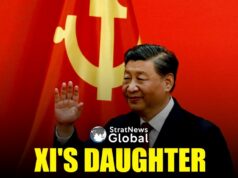Xi’s ‘Complete Victory’ Against Poverty
Chinese state media outlets are extremely impressed by President Xi Jinping’s declaration that he has lifted his countrymen out of absolute poverty. What this means, according to the government, is that 100 million rural people in 832 impoverished counties have running water and some level of income. This ensures a great stride towards “Xiaokang”, which means a moderately prosperous society in all respects.
Chinese media has also reported that Xi has attached great importance to poverty alleviation ever since he became general secretary of the CPC Central Committee in 2012. He is credited with the strategy “Targeted Poverty Alleviation,” where local officials draw up a “poverty list” of the poorest households. Money and other aid goes to these individuals and households rather than the entire village. Xi has made it a point to visit such village households, thereby ensuring local officials do their job. “Good days are coming soon,” Xi was quoted in media reports as telling a villager during a visit to a village recently. It appears they have.
Source: CGTN
Mapping Trouble
Get your map right! The South Korean pop band BTS learnt its lesson the hard way when it used what was dubbed an “incorrect” map. The map showed Arunachal Pradesh or what China calls “South Tibet” as part of India, not China. The matter came up when the group’s management Big Hit Entertainment, released data showcasing the group’s revenue in different countries and regions in 2020. A Chinese blogger noticed the map and promptly uploaded it on Chinese social media platform Douban with a warning: get the map right; otherwise, this could damage relations between peoples of the two countries.
Source: Global Times
Dating App Needs College Certificate
China has a plethora of dating apps but there’s one that will only let you create an account based on your resume and the university. Set up by two alumni of Tsinghua University, Beijing’s top-ranked college in 2015, HIMMR, an acronym for How I Met Mr Right, makes its clear that it’s an exclusive club for elite graduates. Arguing that a similar educational background is key to fostering “authentic and efficient” long-term relationships, the dating site ensures only students from China’s Ivy League can sign up. How? Higher education certificates have to be submitted and vetted while those who studied abroad must have their diplomas verified by China’s Ministry of Education. Such practices have resulted in a backlash with many accusing the founders of HIMMR of treating “love like a trade”.
Source: sixthtone.com
China’s ‘Iranians’
China officially recognises 56 ethnic groups but the one that provokes most interest are the Chinese Tajiks. Not to be confused with the Tajiks from Tajikistan, they are known as the “white ethnic group” because of their fair complexion. Tracing their history back to the Han Dynasty (202 BC to 220 AD), this group migrated to China from Iran and many of them still speak Farsi. A mountainous people, many of them opt for military careers and are involved in active service especially in China’s border areas, where they are affectionately known as “Pamir Eagles.” Pamirs is the area where they live.
Source: sohu.com
Virtual Lovers
Tech services are booming but China’s tech ecosystem is beyond compare in the range of services it provides. In pandemic times, it’s pick-me-up services that are doing the best. The first is ‘Virtual Lover.’ Emerging as recently as 2014, the virtual lover services can now be found on shopping platforms, social media sites and elsewhere. The way it works, customers can buy “romantic companionship” when they text, WhatsApp or even call a person to talk about personal problems, look for emotional support and even ask them to “cosplay” which means that they can dress up as your favourite anime and video game characters – a big hit in China.
An hour-long “romance” may cost as little as 30 Yuan (less than $5), or as much as 300 Yuan ($46). Languages such as English, French, Korean and Japanese are offered and one can even select personality types. The only thing you can’t do is meet, if you do your virtual lover could get fired!
Source: radiichina.com















